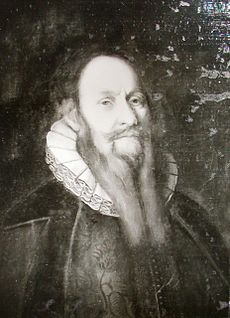| The Most Reverend Laurentius Paulinus Gothus | |
|---|---|
| Archbishop of Uppsala Primate of Sweden | |
 | |
| Church | Church of Sweden |
| Archdiocese | Uppsala |
| Appointed | 1637 |
| In office | 1637–1646 |
| Predecessor | Petrus Kenicius |
| Successor | Johannes Canuti Lenaeus |
| Previous post(s) | Bishop of Skara (1608–1609) Bishop of Strängnäs (1609–1637) |
| Orders | |
| Consecration | 3 August 1608 by Olaus Martini |
| Rank | Metropolitan Archbishop |
| Personal details | |
| Born | 10 November 1565 Söderköping, Sweden |
| Died | 29 November 1646(1646-11-29) (aged 81) Uppsala, Sweden |
| Buried | Strängnäs Cathedral |
| Nationality | Swede |
| Parents | Påvel Pedersson Karin Pedersdotter |
| Spouse | Catharina Olofsdotter (Till 1623) Brita Eriksdotter |
| Alma mater | Uppsala University |
Laurentius Paulinus Gothus (10 November 1565 – 29 November 1646) was a Swedish theologian, astronomer and Archbishop of Uppsala.
Biography
Gothus was born Lars Paulsson at Söderköping in Östergötland County, Sweden. In 1588, Gothus travelled to Germany and studied in the Rostock University for three years. He was influenced by Pierre de la Ramée (1515–1572) and his philosophy.
After receiving a Master's degree, he returned to Uppsala in time for the Uppsala Synod in 1593 where the founding dogmas of the Church of Sweden were made final. He was appointed professor of logic at the recently reopened, and now Lutheran focused, Uppsala University. In 1598 he re-transferred himself to the professorship in astronomy.
He was, along with some other professors, suspended from his duty, because of demands that professors to sign a petition supporting Sigismund III Vasa as king of Sweden. However, in 1604, his Protestant uncle Duke Charles was crowned as King Charles IX of Sweden. When a comet appeared on the sky in 1607, Laurentius declared he could interpret what this signified. The belief in astrology and the significance of heavenly signs were still strong. His interpretations made an impression on King Charles and he was re-instated him at the university.
Laurentius had acquired a belief in Ramism from the writings French educational reformer Petrus Ramus and defended his views rigorously. Later he was also involved in philosophical disputes with Jonas Magni Wexionensis (1583–1651) who was a professor and head of Uppsala University and who was an adherent of Aristotle.
Gothus served as Bishop of the Diocese of Skara (1608–1609) and Bishop of the Diocese of Strängnäs (1609–1637). In 1628, he was tasked with the investigation of the visionary Margareta i Kumla. Her visions and alleged meetings with demons and angels were described by Bishop Gothus in a meeting of the Swedish clergy in 1629. During the reign of Christina, Queen of Sweden, Gothus served as Archbishop of Uppsala and Primate of Sweden from 1637 to 1646.
Works
Laurentius wrote many theological and astronomical works and also published calendars. He furthermore published a thorough Ethica Christiana 1615–30, a work in six parts in Swedish about Lutheranism. Following this, he in 1631 wrote a summary of this work which has been called the prime catechetical work from 17th century Sweden. He also wrote some historical works about Swedish history.
References
- ^ "Laurentius Paulinus Gothus". Svenskt biografiskt lexikon. Retrieved April 1, 2020.
- See entry of Laurentius Paulinus Gothus in the Rostock Matrikelportal
- "Jonas Magni Wexionensis". Svenskt biografiskt lexikon. Retrieved April 1, 2020.
- Nordisk Familjebok (1911), article Laurentius p. 1387–1389
| Archbishops of Uppsala | |||
|---|---|---|---|
| Pre-Reformation Catholic Church in Sweden (1164–1557), Protestant Church of Sweden (1531–present) | |||
| 12th century |  | ||
| 13th century | |||
| 14th century | |||
| 15th–16th centuries |
| ||
| Reformation |
| ||
| 17th century | |||
| 18th century | |||
| 19th century | |||
| 20th century | |||
| 21st century | |||
- Lutheran archbishops of Uppsala
- 17th-century Lutheran archbishops
- Rectors of Uppsala University
- Swedish Lutheran hymnwriters
- 1565 births
- 1646 deaths
- 16th-century Swedish astronomers
- 17th-century Swedish writers
- 17th-century male writers
- 17th-century Swedish astronomers
- Lutheran bishops of Strängnäs
- University of Rostock alumni
- Swedish male writers
- 16th-century Protestant theologians
- 17th-century Protestant theologians
- Writers about religion and science